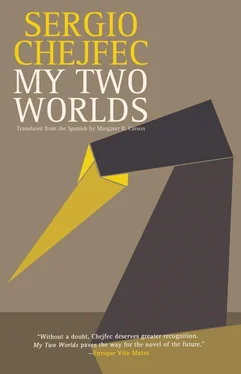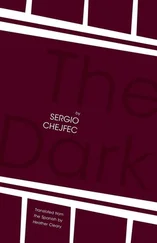I imagined the watch on my wrist and thought of how long it would take to get used to reading the time that way, the questions I’d be asked, and so on. I especially imagined how others would react, that they’d regard the watch as yet another unequivocal sign of my tendency toward moderate extravagance, or, I should say, a mediocre extravagance, so timid as to hardly be verifiable. I also imagined my relatives after this trip to Germany, a sort of advance guard anxious for commentaries and impressions, for stories of panic attacks and scenes of ethnic or cultural shock; and I particularly imagined my nephew and niece, fascinated by the watch and eager to possess it, one of the few anachronistic talismans offered by the modern world, I thought. And lastly I imagined a certain moment in old age, a transcendent scene, the night of the legacy: I would give the reverse watch to my nephew or my niece, a sort of secret handshake marking my abstruse passage through the world, and he or she would keep it as a proof and a symbol, the side of me that would remain with them; the half-distant, fairly alien uncle who had once drawn near, almost at the end, believing it was forever, with that sentimental gesture and that odd device.
I have two prized objects to hand down: my grandfather’s cigarette lighter, and my father’s ivory binoculars. Besides these, nothing I own ever belonged to anyone else. I haven’t thought yet about whether I’ll give both objects to one of them or one to my nephew and the other to my niece. I’d have a problem if there were three of them: even if I tried, the share could never be equal. If I had bought that German watch — I doubt it would have been Chinese back then — I’d have something for a third. But at that moment, as I sat in the park beside the lake, I imagined myself having bought it, so that I had three gifts. The reverse watch pointed to the past, that would be the best legacy, a caveat that we should always look behind us so as to discover our own nature. And what’s the point of knowing our own nature, the nephew or niece might ask. To hide it, I’d reply; to subjugate it, which is impossible, and to hide it, so as to believe we’ve left it behind, etc. To delude ourselves, and move forward.
The watch, I mean, represented a course of action. I recall how its high price impressed me that morning, and I was unsure whether it was due to the watch’s quality or its rarity. Of course, if such an object was to be distinctive, it had also to be a bit expensive, because if it were cheap that would declare its uselessness. I could say a great deal more about the cigarette lighter and the binoculars, in particular I could say that they, unlike the watch, are objects that offer no lessons, despite being excellent heirlooms. A family such as mine, which came out of that void an ocean away, knowing nothing of its history beyond a few decades back, will suddenly in the future have tangible proof of an almost deep past, in objects that will condense the history of individuals and bodies. It could be amazing. And I thought, all thanks to these three objects. In my younger days as a smoker I used to use my grandfather’s cigarette lighter. From time to time, I still use my father’s binoculars, but mostly I periodically open the leather case, which over time has become so thin it’s like dried-out paper about to crumble. I take out the binoculars, heft them and inspect them, peer through them, turn the central wheel to focus, and finally stow them away in their case. Curiously, over time this inspection has turned into a ritual that has nonetheless forgotten its referent; I mean, my memories of my father are by now largely distant; I don’t think of him when I take out the binoculars, except as an idea. Not as a living person, with a voice and a certain warmth but, rather, as a figure that person has occupied ever since he abandoned, as they say, this world.
For reasons of chronology, the cigarette lighter has been with me far longer. And, compared with the binoculars, it has offered a greater range of useful possibilities, at least in my case; and so, as I said, in my days as a smoker I used it quite a bit. I always marveled at its mechanism, which for want of a better word I called automatic; it was my fear of breaking this mechanism by my heavy use that finally persuaded me to stop using it. For years it’s been stored in the depths of a cardboard box, along with old bus tickets and souvenirs that were essential in their day. Now the only important thing in the box is this lighter. Its mechanism consists of a button on the upper-left-hand side; that is, it’s made for right-handed people. Cradling the lighter in your hand, you press the button with your thumb and the top part, a lid in the shape of a cylindrical tube, suddenly flips up. As the lid opens, a cogwheel connected to the hinge strikes the flint, creating a spark that lights the wick. A left-hander could use it, of course, but he or she would have to get used to the inconvenience of the flame igniting inward, not outward, or would have to hold the lighter gingerly and press the button in a rather awkward position.
As I said, for years I took a ridiculous pride in this oddity; from an early age, though I didn’t fully realize it at the time, I was half-aware that it was an object to be handed down. My grandfather was notorious for smoking like a chimney, as they used to say. Every morning the local tobacco shop would deliver a carton of filterless cigarettes. I was in first grade, and could verify that the carton was almost the same size as the 100-piece boxes of chalk I sometimes saw at school. One Saturday, I recall, I was present during a conversation between my grandmother and the owner of the tobacco shop, who pressed her not to allow my grandfather to smoke at such a rate. Either my grandmother was incapable of controlling him, or was so unconcerned that it made no difference to her. But that’s another story; in the end my grandfather continued to get hold of his cigarettes and to smoke in a sort of domestic exile in which, I suppose, as is frequently the case, the tobacco kept him company.
The surface of both sides of the lighter was uniformly striped, with an elegance that to me recalled Art Deco. I’ve seen pewter or perhaps silver-plated cigarette cases with a similar scoring on their cover, a motif, I’ve always thought, that seeks to imitate the futuristic cladding of the early twentieth-century. Down the center of the same side of the lighter as the button, you can see a small rectangular plate, obviously intended to be engraved as one pleases: with a name, initials, or a date. Inevitably for someone as hazy as its former owner, the plate on this lighter is blank. A missing inscription that accentuated the lighter’s availability, or its mysteriousness in any case, because as is true for nearly all manufactured objects, a simple change of hands can send a supposedly well-planned transfer awry, leaving nearly no trace.
I don’t want to generalize, but that is the true condition all objects force on us, not only manufactured ones: that of concealing the history they have witnessed, in complete silence. With some effort on one’s part, they can be made to speak; an entire industry has sprung up around making what’s silent speak. For a time I thought that was why literature existed, books in general, or indeed, the written word itself in any form: the written word confronts what exists so as to get it down. Afterward I stopped attaching so much importance to the matter, which I recall from time to time, on occasions like this, when I’m reconstructing my relationship to some object.
Such were my thoughts in that great German city. I was thinking more about myself, obviously, than about the number of things in all likelihood buried beneath that urban perfection. As long as these weren’t visible, they didn’t matter to me. I thought of the reverse watch and of the valuable lesson it would provide a niece or nephew, and one of their children, and so on through subsequent generations. The perennial lesson of looking behind you, and the irrefutable proof of coming from a specific place. I was sitting on a bench gazing every now and then at the lake, where I could make out the swans in profile as they prowled the lake’s edge, fishing — probably, as I said — for something to eat, and every so often I looked out at the distant avenue besides which the aforementioned railway station stood. I was absorbed in thoughts that had no resolution and were somewhat brief, mere formulations. For instance, I thought: “So far from home. . I would have never imagined being here”; and it also occured to me: “At night, when they turn on the ornamental lights and the rest of the water jets in the lake, everything will look different”; etc. The unceasing jets at the lake’s center signaled, in that sense, the continuity both of one’s thoughts and of the water, like two inseparable elements. .
Читать дальше












